More than 19 million households, representing over 70 million Nigerians, have been captured in the country’s social protection register.
The Minister of Finance and Coordinating Minister of the Economy, Wale Edun, disclosed this on Tuesday at a one-day Stakeholder Engagement organised by the National Social Safety-Nets Coordinating Office in Lagos.
Edun, who was represented by the Minister of Women Affairs, Imaan Sulaiman-Ibrahim, described the register as the “operating system of social protection” in Nigeria.
He said, “More than 19 million households, representing over 70 million Nigerians, had been captured in the register. By linking records to the National Identity Number, names, and bank accounts, we are building a transparent system where every naira spent is traceable to a real person with a real story.”
Corroborating the minister, the NASSCO National Coordinator, Funmi Olotu, said that as of August 31, 2025, the National Identification Numbers of 9,590,043 individuals had been reported.
She added that out of these, 9,142,423 NINs had been shared with the National Identity Management Commission, while 8,397,702 had been validated.
Olotu described the social register as a “living instrument of hope” for millions of households.
She said, “The National Social Register is more than numbers. It is a reflection of the lives, struggles, and resilience of Nigerians across the 36 states. It ensures that government policies are anchored on credible data. We have repositioned the National Social Register, ensuring that support reaches the households that need it most.”
She also stressed the need for collaboration among all tiers of government and development partners to regularly update the register.
Nasarawa State Governor, Abdullahi Sule, painted a grim picture of rural poverty, disclosing that the state had expanded its register to cover more than 570,000 households, representing nearly 1.9 million people as of July.
“If you want to see naked poverty, you only need to visit some of our villages. You can feel it, you can touch it, and you can see people living in real poverty,” he said.
He added, “If you know what we went through, you would appreciate the scale of that achievement. In a state of just over three million, to have nearly two million people captured is no small feat.”
Sule recalled that his administration, on assumption of office in 2019, prioritised marginalised groups, including Almajirai and persons living with disabilities.
“After I was sworn in, we came across about 4,000 Almajirai in the state. After much deliberation on how to help them, we started giving them N5,000 every month. They pooled the money together as Adashe and gave it to one person each month to start small businesses.
“They even contributed money and bought a pair of shoes, which they presented to me. When they brought it to me, I was in tears. Today, over 6,000 of them are beneficiaries of this intervention, receiving N10,000 monthly,” the governor narrated.
The World Bank Country Director for Nigeria, Matthew Verghis, represented by Senior Operations Officer Fatima Jagun, acknowledged that the reform agenda of the President Bola Tinubu administration had imposed severe burdens on vulnerable households.
He, however, commended the government for anchoring interventions on the National Social Register, describing it as one of the largest in the world and a vital tool for social protection delivery.
Jagun said, “These reforms are indeed a bold step in Nigeria’s journey towards economic stability and growth. While the reforms are necessary, the associated increases in the cost of goods and services have affected households, particularly the poor and vulnerable.
“We applaud the Nigerian government for the conscious and thoughtful interventions to support the poor, the vulnerable, and small and medium-scale businesses. Social protection is an investment in people, providing stability to household consumption, enabling access to health care, helping families to build human capital for the next generation, and giving them a chance at resilience.”
He stressed that shock-responsive benefit transfers delivered through digital platforms were critical to building public trust and long-term resilience.
“While collaborations with the World Bank and other development partners have been important in building these systems to their current state, sustainability will come from the government’s strategic investment in strengthening institutions and governance,” he added.
Chairman of Heirs Holdings, Tony Elumelu, cautioned that hunger poses a direct threat to security.
“People who are happy, well-fed, and properly catered for do not pose any form of security threat to a country. It is when people are not happy, not well-fed, that this happens. Wealth creation means nothing if we have the poor among us unable to cater for themselves,” he said.
Elumelu urged Nigeria’s global partners to support the country’s social protection efforts with tangible commitments.
“I call on Friends of Nigeria, our global partners around the world, to rally together, not just in words but in tangible action, to support the government’s poverty alleviation drive. Let us help people become self-reliant, able to cater for themselves without depending on endless support. This is achievable. This is possible,” he said.
The National Coordinator of the National Social Investment Programmes Agency, Badamasi Lawal, described cash transfers delivered through the register as success stories with direct impact on vulnerable Nigerians.
“When the income of the poor rises, the wealth of the nation rises as well. Giving stipends to the vulnerable will continue to increase the wealth of the nation,” he said, urging stakeholders to embrace the conference theme as a call to collective transformation.
The Alara of Ilara Kingdom, Oba Olufolarin Ogunsanwo, stressed that the register was a duty owed to every Nigerian, irrespective of status, ethnicity, or location.
He said, “Let us ensure that the National Social Register remains dynamic, transparent, and accessible, so that no vulnerable group is left behind,” while urging stakeholders to ensure solution-oriented discussions and people-centred planning.
Among dignitaries at the event were Lagos State Governor, Babajide Sanwo-Olu, represented by his Deputy Chief of Staff, Sam Egube; Delta State Governor, Sheriff Oborevwori, represented by Commissioner for Humanitarian Affairs, Orode Uduaghan; Katsina State Governor, Dikko Radda, represented by his Deputy, Faruk Lawal; and Borno State Governor, Babagana Zulum, represented by his Deputy, Umar Usman.
Others included Niger State Governor, Umar Bago, represented by his Deputy, Yakubu Garba; Osun State Governor, Ademola Adeleke, represented by his Special Adviser on Economic Planning, Adeniran Adekola; Minister of State for Humanitarian Affairs and Poverty Reduction, Yusuf Sununu; Director-General of the National Identity Management Commission, Abisoye Coker-Odusote; as well as traditional rulers and other dignitaries.









